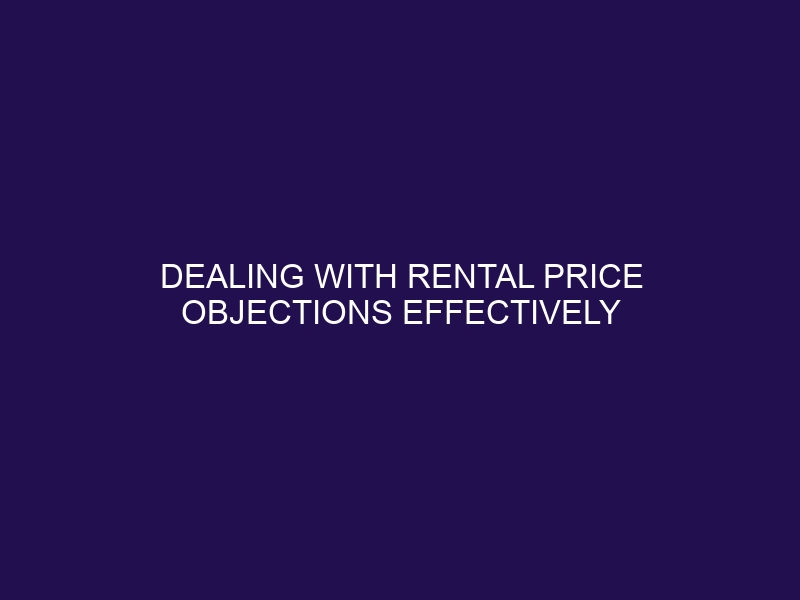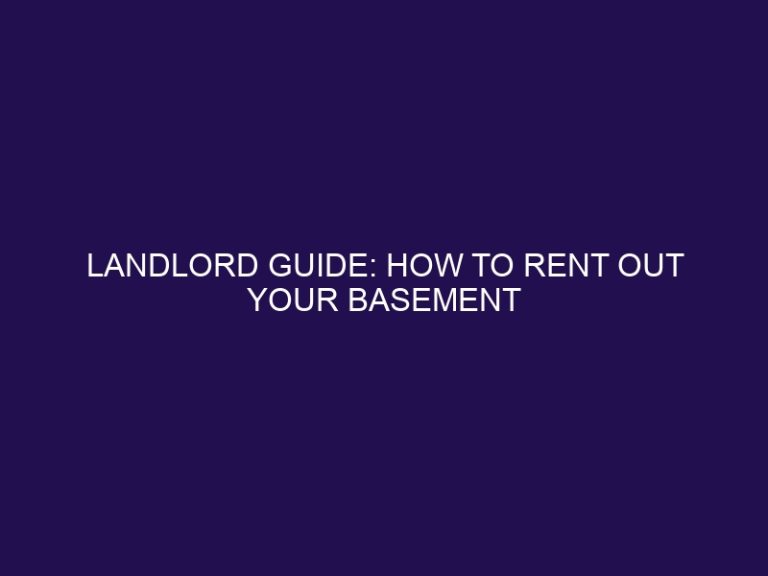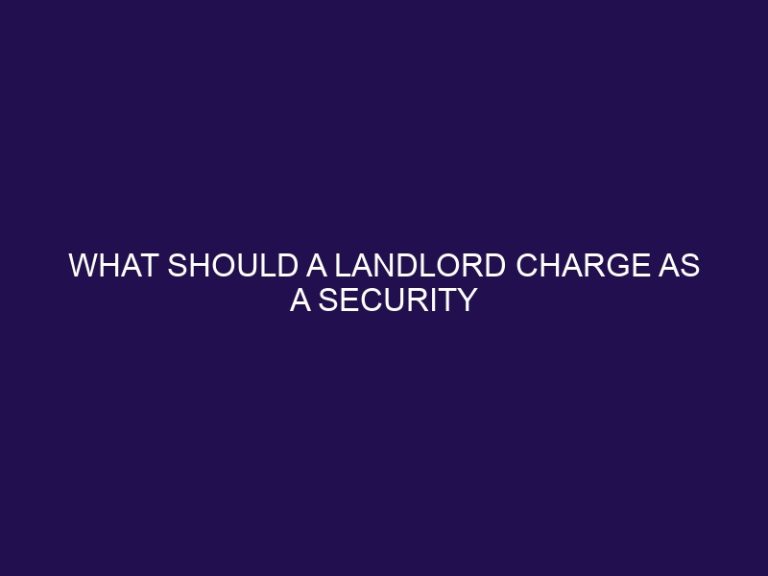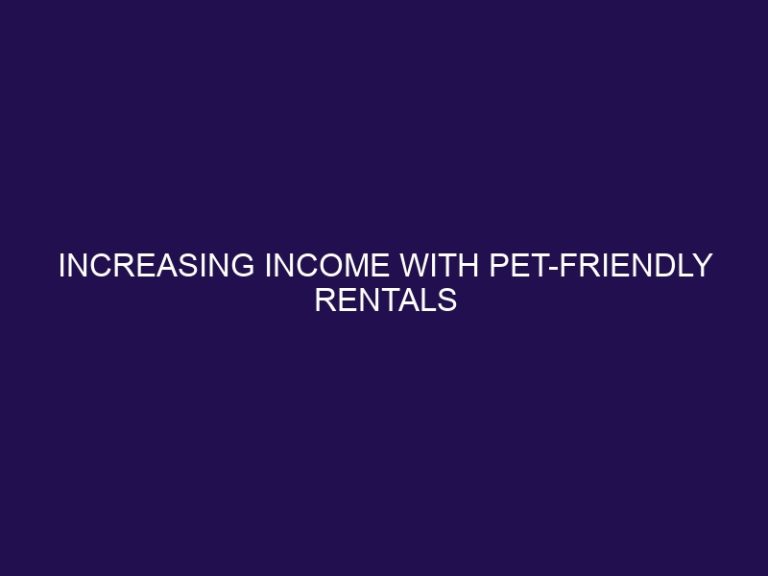Dealing with Rental Price Objections Effectively
Understanding Rental Price Objections: Rental price objections are common concerns raised by potential tenants when considering a rental property. These objections can be a barrier to closing a deal and can lead to a loss of revenue for property owners. However, by handling these objections effectively, property owners can overcome them and secure a successful rental agreement.
Rental price objections are typically raised by customers due to various reasons, such as budget constraints, perceived lack of value, and comparisons to other properties. It is essential to understand these objections to effectively address them and turn them into positive outcomes for both parties.
So, how can property owners handle rental price objections effectively? Here are some tips to keep in mind.
How to Handle Rental Price Objections:
- Listen to the Customer’s Concerns: It is crucial to understand the customer’s perspective and listen to their concerns. This will help in addressing their specific objections and finding a solution that works for both parties.
- Explain the Value of Your Rental Property: Property owners should highlight the unique features and benefits of their rental property that justify the price. This can include location, amenities, and services included in the rental.
- Provide Comparisons to Similar Properties: Offering comparisons with other similar properties in the area can help customers understand the value of the rental property and justify the price.
- Offer Flexible Payment Options: In some cases, customers may be willing to pay the asking price but may have concerns about the payment terms. By offering flexible payment options, such as monthly installments or a security deposit waiver, property owners can alleviate these concerns and close the deal.
Common Mistakes to Avoid when Dealing with Rental Price Objections:
- Being Defensive: It is essential to remain calm and professional when handling price objections. Being defensive or dismissive of a customer’s concerns can lead to a breakdown in the negotiation process.
- Not Understanding the Market: Property owners should research the rental market and set a competitive price for their property. Failure to do so can result in unrealistic expectations and unnecessary objections from potential tenants.
- Focusing Only on the Price: While price is a significant factor in rental decisions, it is not the only consideration. Property owners should also highlight the value and benefits of their property to justify the price.
How to Prevent Rental Price Objections:
- Research the Market and Set a Competitive Price: By understanding the rental market and setting a competitive price, property owners can prevent potential objections from arising.
- Highlight Unique Features and Benefits of Your Property: Emphasizing the unique features and benefits of the rental property can help potential tenants see the value and justify the price.
- Build a Good Relationship with Potential Tenants: By building a good relationship with potential tenants, property owners can create a positive rapport and increase the chances of securing a successful rental agreement.
In conclusion, dealing with rental price objections effectively is crucial for property owners to secure a successful rental agreement. By understanding these objections, handling them professionally, and taking preventive measures, property owners can overcome price objections and secure a mutually beneficial rental agreement. Remember to stay confident, listen to the customer’s concerns, and highlight the value and benefits of your rental property.
Understanding Rental Price Objections
To fully understand and address rental price objections, it is important to acknowledge concerns surrounding affordability, perceived value, and market comparisons. This can be achieved through empathetic listening, transparent cost breakdowns, and highlighting the distinct advantages of the rental property.
What Are Rental Price Objections?
Rental price objections refer to customers’ concerns about the cost of renting a property. These objections may arise due to budget constraints, perceived lack of value, or comparison with other properties.
Recently, a potential tenant expressed concerns about the price, but after discussing the unique features of the property, they were convinced to agree to the rental terms.
Why Do Customers Have Rental Price Objections?
Customers often have objections to rental prices due to budget constraints, a perceived lack of value, or better offers from other sources. By understanding the reasons behind these objections, landlords can effectively address concerns and tailor their approach to better meet the needs of their tenants.
How to Handle Rental Price Objections
As a rental property owner, you may encounter objections from potential tenants regarding the price of your rental. However, these objections can be effectively addressed by following a few key strategies. In this section, we will discuss how to handle rental price objections in a professional and persuasive manner. From actively listening to the customer’s concerns to offering flexible payment options, we will cover the techniques that will help you overcome objections and secure tenants for your property.
1. Listen to the Customer’s Concerns
- Actively listen to the customer’s concerns and acknowledge their perspective.
- Use open-ended questions to further understand their reservations.
- Show empathy towards their worries and demonstrate a sincere interest in addressing them.
2. Explain the Value of Your Rental Property
- Highlight the unique features and amenities of the property
- Showcase the convenient location and easy access to transportation
- Emphasize the high quality of the neighborhood and nearby facilities
- Highlight any recent upgrades or renovations made to the property
A true story: One of our clients was initially hesitant about the rental price, but after we explained the outstanding location and recent upgrades of the property, they were convinced of its value and signed the lease.
3. Provide Comparisons to Similar Properties
- Compare the location, amenities, and condition of rental properties.
- Highlight any unique selling points, such as updated appliances or proximity to public transport.
- Present data on rental rates of similar properties in the area for comparison.
4. Offer Flexible Payment Options
- Provide a variety of payment methods, including credit cards, direct bank transfers, and online payment platforms.
- Offer flexible lease terms, including monthly, quarterly, or semi-annual payment schedules.
- Incentivize prompt settlements by offering discounts for early or on-time payments.
Common Mistakes to Avoid when Dealing with Rental Price Objections
When it comes to dealing with rental price objections, there are certain mistakes that can hinder your success. In this section, we will discuss the common pitfalls to avoid when faced with objections to your rental price. By being aware of these mistakes, you can effectively navigate through objections and close the deal. We will cover the dangers of being defensive, the importance of understanding the market, and the potential consequences of solely focusing on the price.
1. Being Defensive
- Listen actively without interrupting.
- Empathize with the concerns raised.
- Focus on solutions and benefits rather than being defensive and justifying the price.
- Offer concessions or additional value to address objections.
Did you know? Customer retention is 5 times cheaper than acquiring new customers.
2. Not Understanding the Market
- Educate yourself about current rental rates in the area.
- Understand the demand and supply dynamics of the rental market.
- Stay updated on economic factors influencing rental prices, including changes in the market.
Once, a property owner failed to adjust rent despite market changes, losing potential tenants. After researching, they lowered the rent and attracted quality tenants.
3. Focusing Only on the Price
- Go beyond just the price and understand tenants’ needs.
- Highlight the value and benefits of the property.
- Emphasize the unique features and flexible terms.
Fact: 65% of tenants prioritize property value over rental price.
How to Prevent Rental Price Objections
As a landlord or property manager, one of the most common challenges you may face is objections to your rental prices. However, with the right strategies, you can effectively prevent these objections from arising in the first place. In this section, we will discuss three key ways to avoid rental price objections: researching the market and setting a competitive price, highlighting the unique features and benefits of your property, and building a good relationship with potential tenants. By implementing these techniques, you can attract quality tenants and avoid unnecessary negotiations over rental prices.
1. Research the Market and Set a Competitive Price
- Thoroughly research the market to understand current rental rates.
- Analyze the unique selling points of your property and use them to justify setting a competitive price.
- When determining the price, take into consideration the location of the property, its amenities, and the current demand in the local area.
2. Highlight Unique Features and Benefits of Your Property
- Emphasize aspects such as location, amenities, energy-efficient appliances, and security measures to attract potential tenants.
3. Build a Good Relationship with Potential Tenants
- Communicate Openly: Establish clear channels for tenants to address concerns.
- Provide Support: Offer prompt assistance and maintain a friendly, professional demeanor.
- Engage with Tenants: Organize community events to foster a sense of belonging.
Building a good relationship with potential tenants is crucial for establishing a harmonious landlord-tenant dynamic.
Remember to Stay Confident and Professional
When facing objections about rental prices, it is essential to maintain a confident and professional demeanor. This includes actively listening to the concerns, highlighting the value of the property, providing comparisons, and offering flexible payment options. It is also important to avoid becoming defensive, have a good understanding of the market, and establish positive relationships with potential tenants.
Frequently Asked Questions
What are the common objections raised by potential tenants when it comes to rental pricing?
Objections can range from pricing concerns to location issues and maintenance worries. Some interested applicants may feel that the rental value does not justify the price, while others may have budget constraints or specific concerns about the property.
How can multi-family apartment leasing agents overcome objections related to rental pricing?
By mastering the art of addressing objections, leasing agents can boost leasing success, increase occupancy rates, and solidify their position in the competitive market. This can be achieved through thorough preparation, effective communication, and preemptively addressing objections.
Can you give an example of how highlighting value can help overcome pricing objections?
Sure! Sarah, a potential tenant, is hesitant about the rental price at The Dylan Apartments. The leasing agent showcases amenities such as a state-of-the-art fitness center, rooftop lounge, and dog park, impressing Sarah with added lifestyle benefits and value in return.
What are some strategies for preemptively addressing objections related to rental pricing?
Thorough preparation is key. Study the property inside out and be aware of its strengths and weaknesses. Develop concise and compelling sales pitches that highlight unique selling points to differentiate the value of your property. Anticipating potential concerns and addressing them proactively can help you secure long-term tenants.
How can a property manager handle rental price objections without losing the deal or compromising their profit margin?
The first step is to know your market value by researching the current supply and demand, average rent and occupancy rates, and features of comparable properties in your area. The next step is to communicate your value proposition to potential tenants and showcase the benefits and features of your property. Offering incentives and negotiating can also help address objections and close the deal.
What is the importance of building rapport and trust with potential tenants when dealing with rental price objections?
Building trust and rapport with interested applicants is crucial in overcoming objections and securing long-term tenants. By using open-ended questions, positive body language, and empathizing with their concerns, leasing agents can create a connection with the potential tenant and encourage them to sign the lease or join the waiting list for a limited time offer.







